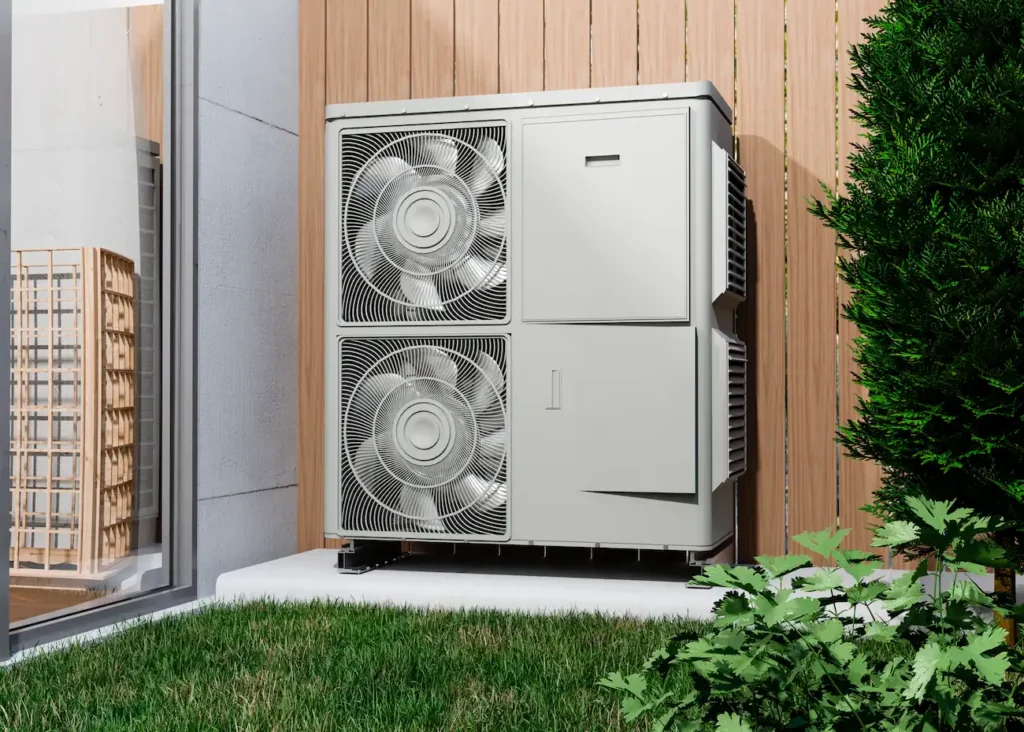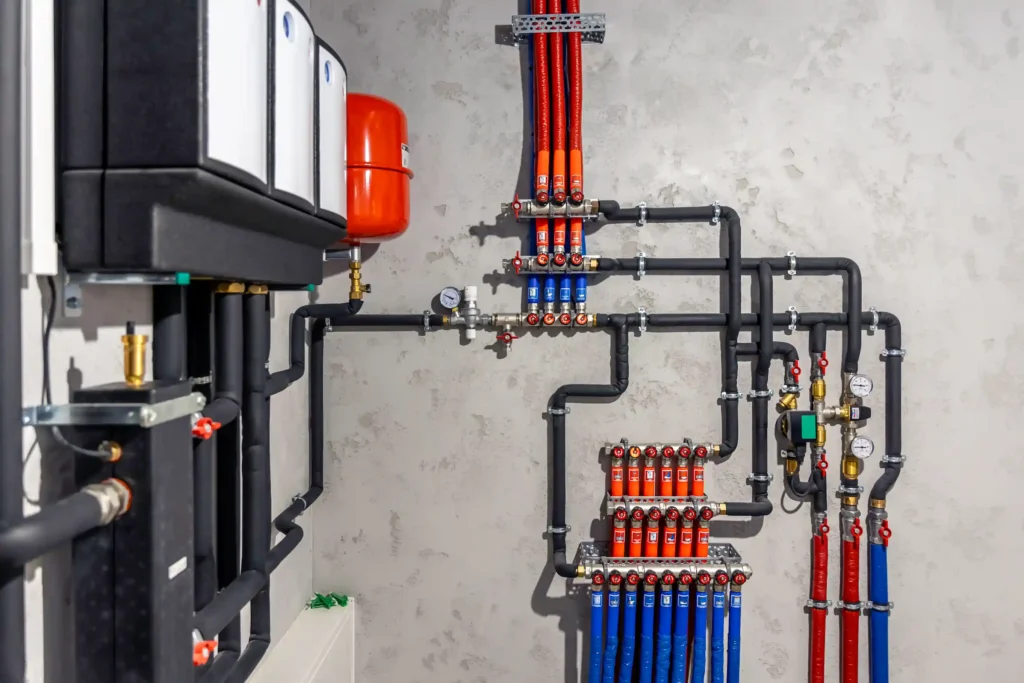Heat pumps are rapidly becoming the UK’s go-to eco-friendly heating solution, with installation rates climbing 43% in 2024 alone. But with several types available — each with different costs, performance levels, and suitability for various properties — understanding which option fits your home can feel overwhelming. This comprehensive guide breaks down everything you need to know about the main types of heat pumps available in the UK, helping you make an informed decision that suits both your property and your budget.

What Is a Heat Pump and How Does It Work?
A heat pump works like a refrigerator in reverse: instead of removing heat to keep food cold, it captures warmth from the air, ground, or water and transfers it into your home. Even below freezing, usable heat remains available.
Unlike boilers, heat pumps don’t burn fuel — they move existing heat using electricity, making them highly efficient. They typically deliver 3–4 times more heat than the electricity they use (which means an efficiency of 300%-400%), compared to about 90% efficiency for top gas boilers.
Recognising their role in reaching net-zero emissions by 2050, the UK government offers grants of up to £7,500 through the Boiler Upgrade Scheme to encourage adoption. With fossil fuel systems being phased out, choosing the right heat pump has never been more relevant.
The Main Types of Heat Pumps in the UK
1. Air Source Heat Pumps (ASHP)

Air source heat pumps are by far the most popular choice in the UK, accounting for 96% of heat pump installations under the Boiler Upgrade Scheme. These systems extract heat from outdoor air and transfer it into your home, making them suitable for the vast majority of UK properties.
How They Work:
An outdoor unit containing a fan draws air over a heat exchanger. A refrigerant inside absorbs the heat and is then compressed to increase its temperature further. This heat is transferred indoors to warm your home and provide hot water.
Two Subtypes:
- Air-to-Water Systems: These connect to your existing wet heating system (radiators or underfloor heating) and provide hot water. They’re the most common type in UK homes and work seamlessly with traditional central heating setups.
- Air-to-Air Systems: These provide heating and cooling directly through indoor units (similar to air conditioning) but don’t provide hot water. They’re less common in UK residential properties but can be useful for specific applications.
Installation Costs:
Installing an air source heat pump generally costs between £8,000 and £15,000. However, after applying the £7,500 Boiler Upgrade Scheme grant, homeowners usually pay somewhere between £500 and £7,500, with most homeowners paying around £4,500-£5,000 after the grant.
Pros:
- Lower upfront costs compared to ground source systems
- Easier and faster installation (typically 1-3 days)
- No garden excavation required
- Suitable for most UK properties
- They operate at an average efficiency of about 300%, meaning they produce roughly three times more heat energy than the electricity they consume.
- Well-established technology with many experienced installers
Cons:
- Slightly lower efficiency than ground source systems
- Their performance can dip slightly during very low temperatures, although most modern systems still perform well even when it’s as cold as -20°C.
- Outdoor unit is visible on your property
- Produces some operational noise (though modern units are surprisingly quiet, similar to a modern fridge)
Popular UK Brands:
Reputable manufacturers include Mitsubishi Electric, Daikin, Vaillant, and Viessmann. Always ensure your chosen installer is MCS (Microgeneration Certification Scheme) certified — this is mandatory for accessing government grants and ensures quality installation.
2. Ground Source Heat Pumps (GSHP)

Ground source heat pumps extract heat from the earth using a network of pipes buried in your garden. Because ground temperatures remain stable year-round (typically 8-12°C in the UK), these systems offer excellent consistency and higher efficiency than air source alternatives.
How They Work:
Pipes filled with a water-antifreeze mixture are buried either horizontally in trenches (requiring 600-1,200 square metres of land) or vertically in boreholes (requiring less surface area but more expensive drilling). The fluid circulates through these pipes, absorbing heat from the ground, which is then concentrated and transferred into your home.
Installation Costs:
Installing a ground source heat pump usually costs anywhere from £16,000 to £49,000, with most homeowners paying about £24,000 on average. After applying the £7,500 Boiler Upgrade Scheme grant, expect to pay £8,700-£41,500, though most typical installations fall in the £16,500-£25,000 range post-grant.
Efficiency and Performance:
These systems typically reach efficiency levels between 350% and 450%, offering some of the best performance among all heat pump options. Their performance remains consistent regardless of air temperature, delivering reliable heating even during the coldest UK winters.
Pros:
- Highest efficiency levels of any heat pump type
- Extremely consistent performance year-round
- Their indoor components generally last over 25 years, while the underground pipework can remain functional for half a century or more.
- Lower running costs than air source systems
- Very quiet operation (no noisy outdoor fan unit)
- Invisible once installed (all pipes are underground)
Cons:
- Significantly higher installation costs
- Requires substantial garden space (600-1,200 m² for horizontal systems)
- More disruptive installation process
- Not suitable for all properties
- Longer installation time (typically one week)
| Criterion | Air Source | Ground Source |
|---|---|---|
| Efficiency | 300% | 350-450% |
| Installation Cost | £8,000-£15,000 | £16,200-£49,000 |
| Cost After Grant | £500-£7,500 | £8,700-£41,500 |
| Space Needed | Low | High (600-1,200m²) |
| Installation Time | 1-3 days | 1 week+ | Lifespan | 15-20 years | 25+ years (loops: 50+ years) |
| Best For | Most UK homes | Rural properties with land |
3. Water Source Heat Pumps (WSHP)

Water source heat pumps are the least common option in the UK but offer exceptional performance if your property is located near a suitable water source such as a lake, river, or large pond.
How They Work:
Pipes are submerged in the water body, where a refrigerant absorbs thermal energy. Because water temperatures remain relatively stable (7-12°C year-round), these systems provide consistent, efficient heating throughout all seasons.
Installation Costs:
The heat pump equipment itself usually ranges from £5,000 to £18,000, not counting the additional cost of installation. Total installed costs typically range from £10,000-£25,000, though this varies significantly based on the distance from your home to the water source and any required permissions. After applying the £7,500 grant under the BUS (which is available for water‑source heat pumps as they are treated in the same category as ground‑source systems) the net cost to the homeowner would typically fall in the region of £2,500–£17,500.
Efficiency:
They can reach exceptionally high efficiency levels, typically between 300% and 600%, thanks to the consistent temperature of water sources.
Pros:
- Highest potential efficiency of any heat pump type
- They may help reduce annual heating bills by as much as £1,200, depending on usage and energy prices.
- Very stable heat source with minimal temperature fluctuation
- A well-installed system generally lasts between two and two-and-a-half decades.
- Quiet operation
Cons:
- Requires access to a suitable water body
- Planning permission often required
- May need water extraction licenses
- Installation complexity depends on distance to water source
- Environmental regulations apply
- Not eligible for the Boiler Upgrade Scheme in most cases
- Limited number of experienced installers in the UK
Suitability:
Water source heat pumps make sense only if your property is within reasonable distance (typically under 100 metres) of a suitable lake, river, or pond. The water source must be large enough to provide consistent temperatures and you’ll need to navigate planning permissions and environmental regulations.
4. Hybrid Heat Pumps

Hybrid systems combine an air source heat pump with a traditional gas or oil boiler, offering a flexible transition option for homeowners not ready to fully commit to renewable heating.
How They Work:
A smart control system monitors outdoor temperatures and energy costs, automatically switching between the heat pump and boiler to optimise efficiency and comfort. In moderate weather, the heat pump usually covers nearly all heating requirements, while the boiler steps in during colder periods or when extra power is needed.
Two Main Configurations:
- Temperature-Based Switching: The system switches to the boiler when outdoor temperatures drop below a set point (typically around 0°C to -5°C) where heat pump efficiency decreases.
- Cost-Based Switching: Intelligent control systems can track energy prices in real time and automatically choose the most economical energy source.
Installation Costs:
Installing a hybrid system generally costs between £5,000 and £10,000, with the typical total coming to about £9,000. This assumes you already have a functioning boiler; if a new boiler is needed, costs increase accordingly.
Important Limitation:
Hybrid systems are NOT eligible for the Boiler Upgrade Scheme £7,500 grant. This is a significant disadvantage compared to standalone heat pump systems and means your upfront costs won’t benefit from government support.
Efficiency:
When a hybrid setup uses the heat pump for roughly 80% of the time and the boiler for the remaining 20%, the combined efficiency works out to around 260% — better than a boiler alone but lower than a dedicated heat pump system.
Pros:
- Maintains familiar backup heating system
- Less radical change for homeowners concerned about full electrification
- Compared with a conventional boiler system, a hybrid configuration can reduce heating expenses by as much as £1,200 per year.
- Reliable heating even in extremely cold weather
- Good option for larger or poorly insulated homes
- Flexibility to transition fully to heat pump heating in future
Cons:
- No eligibility for £7,500 Boiler Upgrade Scheme grant
- Higher installation costs than standard heat pumps
- Still reliant on fossil fuels
- More complex system with two technologies to maintain
- To reach peak performance, these systems need to be precisely configured and calibrated.
- Running costs higher than dedicated heat pump systems
Which Type of Heat Pump Is Best for You?

Choosing the right heat pump depends on your property characteristics, budget, and long-term plans. Here’s a practical guide to help you decide:
Choose Air Source Heat Pumps If:
- You live in a typical UK home (terraced, semi-detached, or detached house)
- You want the most cost-effective option with government grant support
- Your property has limited outdoor space
- You want a straightforward, quick installation
- You’re looking for proven technology with many experienced installers
- Your home has reasonable insulation (EPC rating C or better recommended)
Ideal for: 90% of UK homeowners, including small city homes, suburban properties, and most new builds.
Choose Ground Source Heat Pumps If:
- You own a rural property with substantial garden space (600-1,200 m²)
- You’re planning to stay in your home long-term (10+ years)
- You want the highest efficiency and lowest running costs
- You have a larger budget for upfront investment
- Your property is well-insulated
- You value a quiet, invisible heating system
Ideal for: Rural properties, large detached homes with gardens, properties planning major renovations, long-term homeowners prioritizing maximum efficiency.
Choose Water Source Heat Pumps If:
- Your property is located near a lake, river, or large pond (within 100m)
- You’re willing to navigate planning permissions and water extraction licenses
- You want the highest potential efficiency
- You can find experienced installers familiar with water source systems
- You’re prepared for a bespoke installation
Ideal for: Lakeside properties, homes near rivers, estates with private water bodies — a niche but excellent solution for suitable locations.
Choose Hybrid Heat Pumps If:
- You’re not ready to fully commit to electric heating
- Your home has poor insulation and significant heat pump upgrades seem daunting
- You want to keep your existing boiler as backup
- You live in an area with extreme winter temperatures
- You can’t access the Boiler Upgrade Scheme for other reasons
- You want flexibility during the transition to cleaner heating
Ideal for: Older properties with poor insulation, homes in particularly cold regions, homeowners wanting a gradual transition, properties where full heat pump installation isn’t yet feasible.
Conclusion: Choosing the Right Heat Pump for a Sustainable Future
The UK’s heating landscape is transforming, and heat pumps are leading the charge toward cleaner, more efficient home heating. Whether you opt for the air source heat pump, the highly efficient ground source system, the niche water source option, or the transitional hybrid approach, you’re making a positive choice for both your home and the environment.
Key Takeaways:
- Air source heat pumps offer the best balance of cost, performance, and practicality for most UK homes
- Ground source heat pumps deliver the highest efficiency and are ideal for rural properties with space
- Water source heat pumps provide exceptional performance but require suitable water body access
- Hybrid systems offer flexibility but miss out on the £7,500 government grant
With the Boiler Upgrade Scheme offering £7,500 grants and energy efficiency requirements tightening, 2025 is an excellent year to make the switch. The combination of government support, advancing technology, and growing installer expertise makes heat pump installation more accessible than ever.
Ready to take the next step? Contact us or expert advice and a personalised evaluation of your property. Begin your journey to efficient, eco-friendly heating that protects both your budget and the environment.
Frequently Asked Questions
What are the 3 main types of heat pumps?
The three main types of heat pumps are:
- Air Source Heat Pumps (ASHP) – extract heat from outdoor air
- Ground Source Heat Pumps (GSHP) – extract heat from the ground
- Water Source Heat Pumps (WSHP) – extract heat from lakes, rivers, or ponds
A fourth option, Hybrid Heat Pumps, combines an air source heat pump with a traditional boiler for added flexibility.
Are heat pumps worth it in the UK climate?
Yes, modern heat pumps are specifically designed to work efficiently in the UK climate.
Air source heat pumps function effectively down to -20°C, well below typical UK winter temperatures.
Ground and water source systems perform even better due to stable underground and water temperatures.
With the £7,500 Boiler Upgrade Scheme grant, heat pumps are increasingly cost-competitive with traditional heating systems, especially for homes currently using oil, LPG, or electric heating.
For more details, read our article on whether heat pumps are worth it in the UK climate.
What is the most efficient heat pump type?
Ground source heat pumps are the most consistently efficient, achieving 350-450% efficiency (COP of 3.5-4.5).
However, water source heat pumps can potentially achieve even higher efficiency ratings of 300-600% (COP of 3-6) if you have access to a suitable water body.
Air source heat pumps, while slightly less efficient at around 300% (COP of 3), still dramatically outperform traditional boilers and are the most practical choice for the majority of UK homes.
Sources
- Greenmatch. (2025). “Air Source Heat Pump Costs in the UK: 2025 Guide.” https://www.greenmatch.co.uk/heat-pumps/cost
- Elite Energy. (2025). “Air Source Heat Pump Cost: Updated 2025 UK Prices.” https://eliteenergy.co.uk/air-source-heat-pump-cost-uk-2025/
- The Eco Experts. (2025). “Heat Pump Costs 2025: Factors, Calculator & Running Costs.” https://www.theecoexperts.co.uk/heat-pumps/cost-guide
- Heat Pumps UK. (2025). “Air Source Heat Pump Running Costs.” https://heat-pumps.org.uk/air-source-heat-pump-running-costs/2/
- Greenmatch. (2025). “Ground Source Heat Pump Cost in the UK (2025).” https://www.greenmatch.co.uk/ground-source-heat-pump/cost
- Which? (2024). “Ground source heat pump costs and savings.” https://www.which.co.uk/reviews/ground-and-air-source-heat-pumps/article/ground-source-heat-pumps-explained/ground-source-heat-pump-costs-and-savings-aYYGN4A4NFpB
- HomeOwners Alliance. (2025). “How Much Does A Heat Pump Cost 2025.” https://hoa.org.uk/advice/guides-for-homeowners/for-owners/how-much-does-a-heat-pump-cost/
- Checkatrade. (2023). “Water Source Heat Pump Cost Guide in 2025.” https://www.checkatrade.com/blog/cost-guides/water-source-heat-pump-cost/
- WhatCost. (2025). “Water Source Heat Pumps in the UK: Costs, Installation & Benefits.” https://whatcost.co.uk/heat-pumps/water-source
- Greenmatch. (2025). “Hybrid Heat Pumps in the UK: Costs & Benefits (October 2025).” https://www.greenmatch.co.uk/heat-pumps/hybrid
- The Eco Experts. (2025). “Hybrid Air Source Heat Pumps | Costs & Benefits in 2025.” https://www.theecoexperts.co.uk/heat-pumps/hybrid
- GOV.UK. (2025). “Boiler Upgrade Scheme.” https://www.gov.uk/apply-boiler-upgrade-scheme
Commentaires
3 responses to “Different Types of Heat Pumps: UK Homeowner’s Guide”
[…] For a deeper breakdown of every heat pump system available in the UK, read our in-depth guide on air source, ground source, and water source heat pumps. […]
[…] Want to compare options and make an informed choice?Our guide explains everything you need to know about different types of heat pumps. […]
[…] Discover the other types of heat pumps in our full guide. […]